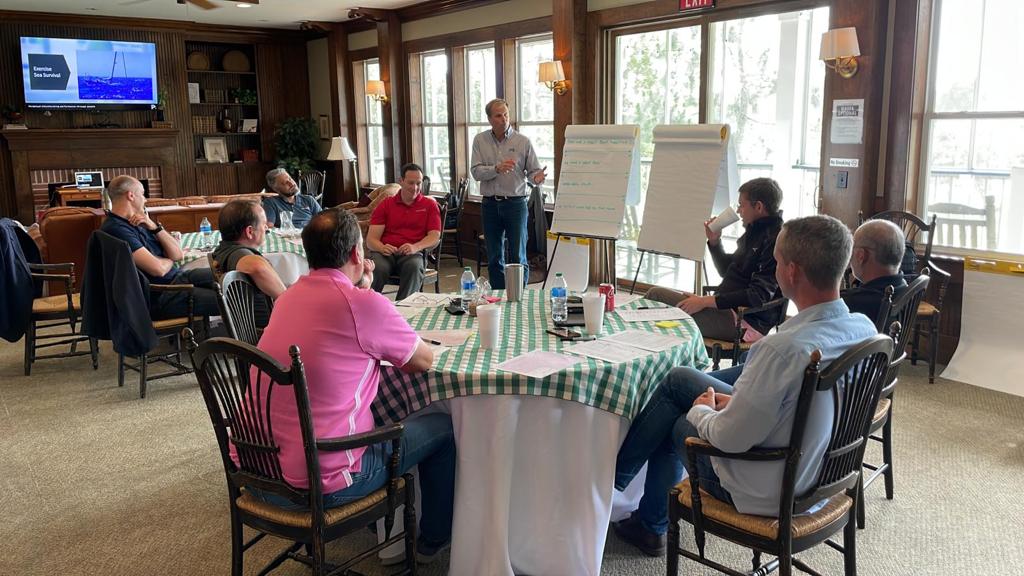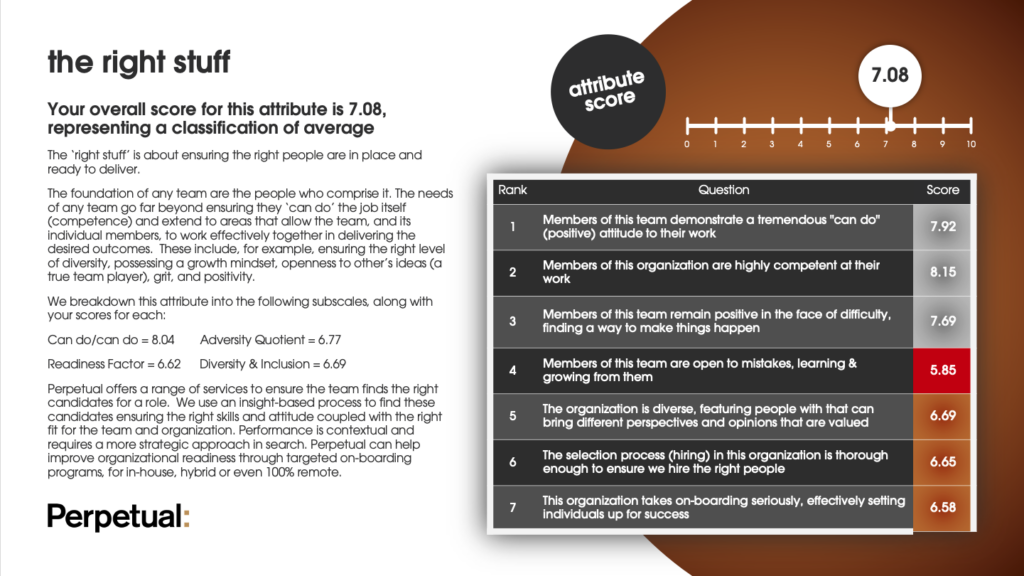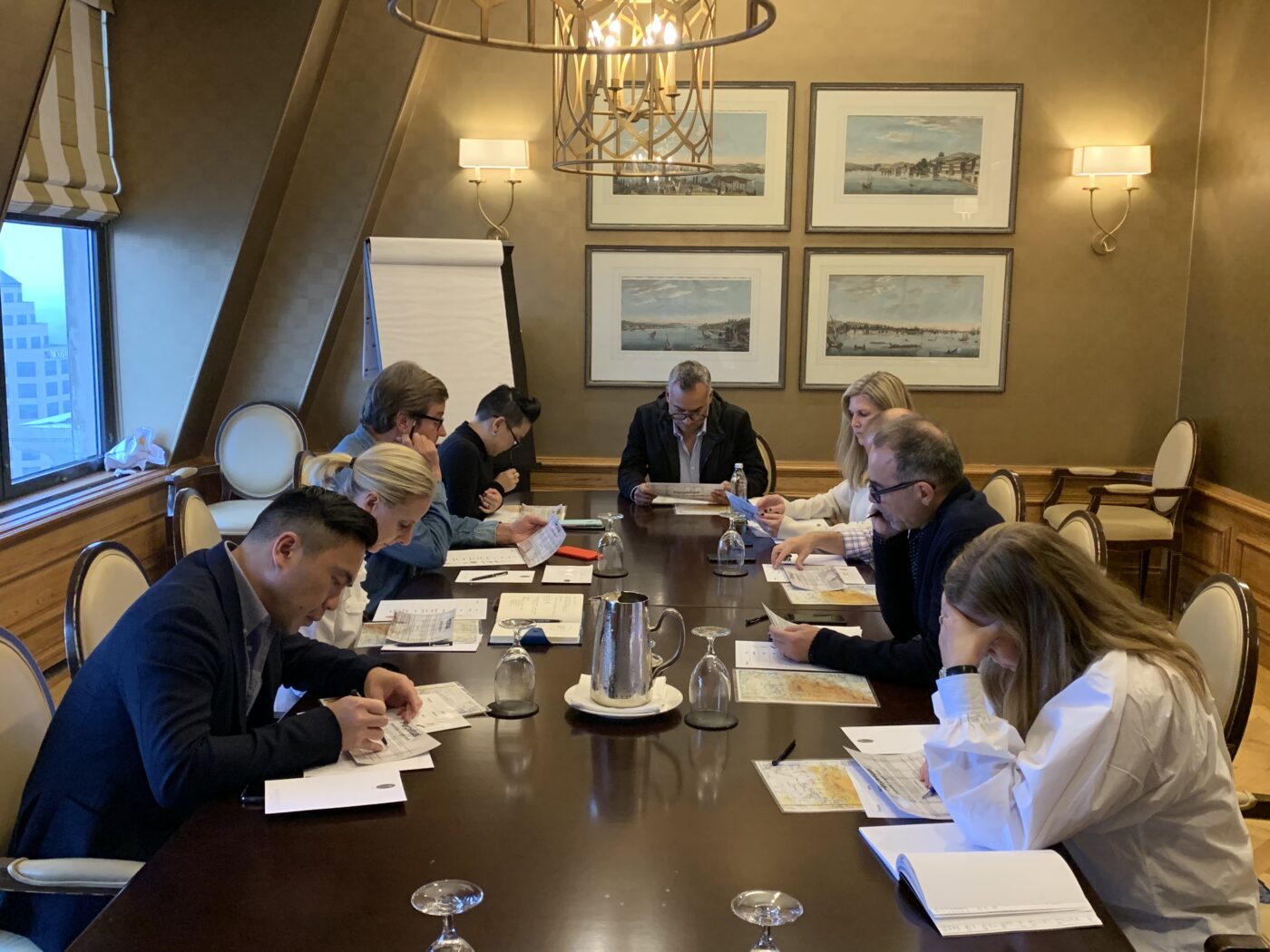Building a high-performing team is a complex task that requires talented individuals who not only have the necessary skills but also the right attitude – at Perpetual we call that the ‘Right Stuff” with attitude. Without a capable and motivated team, the potential for overall team performance is seriously hindered. In this article, we will explore the importance of talent and attitude in team dynamics and discuss strategies to build positive team dynamics in the workplace.
First and foremost, a high-performing team requires talented individuals who can fulfill their expected roles. It is essential to have team members who possess the knowledge, experience, and inherent ability to deliver results in their respective areas. While talent development is an ongoing process, it is crucial to have a baseline level of competence before embarking on the journey towards team-to-togetherness (t3). Competence alone is not sufficient; the attitude of each team member is equally important. Hiring for attitude and training for talent is a mantra that emphasizes the significance of positive attitudes within a team. A self-absorbed or negative attitude can quickly drain collective energy and hinder team performance. Therefore, it is vital to select team members with a « can do » attitude who are willing to contribute to the collective goals.
Understanding your team dynamics is another crucial aspect of working effectively in a team. Team dynamics refer to how individuals within a team interact and relate to each other. By observing the behavior of team members and the overall atmosphere within the group, it is possible to gain insights into team dynamics. Communication styles, decision-making processes, and conflict resolution methods are important factors to consider. Positive team dynamics involve trust, respect, clarity, open communication, and optimistic thinking. When team dynamics are favorable, productivity increases, and goals are achieved more efficiently. On the other hand, poor team dynamics can lead to negative consequences, even if individual team members are talented. Lack of engagement, ineffective communication, and unresolved conflicts can hinder progress and hinder the team’s success.
To improve team dynamics, it is crucial to take proactive steps. The first step is to understand the specific issues the team is facing. This can be achieved by speaking with the team leader or conducting a ‘Perpetual new team leader assimilation program’, observing team interactions, and conducting individual interviews. Once the issues are identified, tailored strategies can be implemented to address them. These strategies may include promoting open communication, developing leadership skills, facilitating collaboration, and resolving conflicts. It is also important to refer to the stages of group formation, such as forming, storming, norming, performing high-performing and legacy, to assess the team’s progress and identify potential issues. By addressing team dynamics promptly and creating a positive experience for team members, leaders can improve productivity and create a positive working environment.
Furthermore, talent assessments can provide valuable insights into individual team members’ motivations and behaviors. Understanding what drives employees and their unique needs can help managers effectively manage teams and navigate team dynamics. Talent assessments can help identify strengths, weaknesses, and behavioral traits of team members, enabling better collaboration and communication. For example, an employee resistant to change may have a higher need for stability and consistency. By providing a clear rationale for change, this employee can become more receptive and engaged.

Building a high-performing team requires talented individuals with the right attitude. Understanding team dynamics and addressing issues promptly is crucial for creating a positive working environment and achieving goals. By integrating talent assessments and implementing strategies tailored to the team’s needs, leaders can enhance team dynamics, improve productivity, and foster a positive and collaborative work culture.
Do you want to know if your team or organization has the ‘Right stuff” with attitude? Read more about our approach below and contact us to find out more.

Take our t3® diagnostic which measures team or organizational health and measures the six attributes of high-performing team journey. Attribute 1 is The Right Stuff with attitude.
Our research-backed diagnostic provides a pulse-check of where your team stands against these six attributes. This, in turn, provides a clear picture as to opportunities to improve team engagement to meet target business outcomes.
The t3® diagnostic allows team leaders to quickly create a reference baseline upon which a catalyzing improvement and growth journey can be founded.
Reminder – The ‘right stuff’ is about ensuring the right people are in place and ready to deliver.
The foundation of any team are the people who comprise it. The needs of any team go far beyond ensuring they ‘can do’ the job itself (competence) and extend to areas that allow the team, and its individual members, to work effectively together in delivering the desired outcomes. These include, for example, ensuring the right level of diversity, possessing a growth mindset, openness to other’s ideas (a true team player), grit, and positivity.
We breakdown this attribute into the following subscales, along with your scores for each:
Can do/can do = XX Adversity Quotient = XX
Readiness Factor = XX Diversity & Inclusion = XX
Perpetual offers a range of services to ensure any team can get to the next level of performance, including finding the right people for mission-critical roles. We use an insight-based process to find these candidates ensuring the right skills and attitude coupled with the right fit for the team and organization. Performance is contextual and requires a more strategic approach than search. Perpetual can help improve organizational readiness through targeted on-boarding programs, new leader assimilation programs, facilitating team dynamic workshops and team coaching.
Want to deliver sustainable growth by solving your biggest people challenges…how?
1 – creating a baseline
Performance is contextual, and therefore finding the right fit and ensuring team and organizational health is vital. Our intake process, inclusive of our t3® diagnostic ensures we understand that context.
2 – design/apply the right solution
Whether it’s finding the right talent and ensuring they land appropriately to delivering provocative workshop interventions, our solutions are designed to ensure sustainable change.
3 – embed for sustainability
For individuals and teams with whom we work, we focus on a handful of game changing rituals that lead to legacy levels of performance.
Take the t3 diagnostic here to see your scores and results today – https://beperpetual.com/services/t3-diagnostic/










